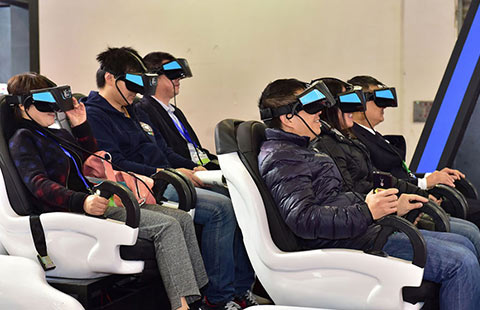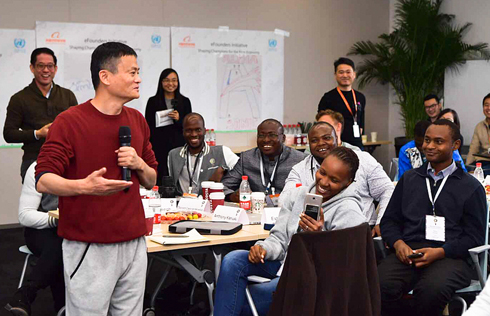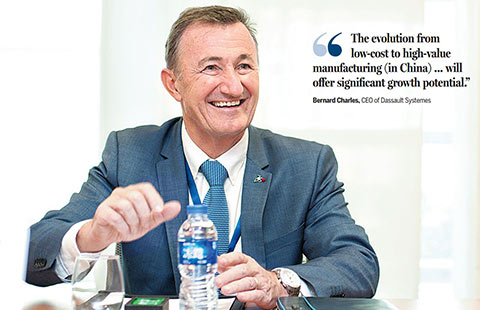China faces green vehicle battery challenge
BEIJING — With the market for new energy vehicles booming, China is now the largest new energy vehicle battery producer. But with the opportunity comes a challenge: how to recycle the growing number of redundant batteries.
China is still exploring regulatory and management systems for battery recycling. Industry and Information Technology Minister Miao Wei recently said China will establish an extended producer responsibility regime, which would make car manufacturers responsible for recycling.
China's total production and sales of new energy vehicles is expected to reach 5 million by 2020. As the average lifespan of power batteries is about five to eight years, according to Gao Gong Industry Institute, a Shenzhen-based research firm, China will see the amount of redundant batteries hit about250,000 metric tons in 2020, almost 20 times that of 2016.
The scrapped batteries, if not properly dealt with, will be a waste of resources as well as a source of pollution. An environmentally sustainable and cost efficient recycling method is a universal concern in the new energy vehicle industry.
Xu Shengming, a researcher at Tsinghua University's Institute of Nuclear and New Energy Technology, says there are two main recycling paths. One is hierarchical-recycling: when the battery is no longer usable due to its declining capacity, it can be re-utilized in alternative energy storage stations, low-speed electric vehicles and distributed power generation. The other path is to dismantle, recycle and reuse the components.
The recycling and reutilization of batteries will be a huge market. "At present, we are in a stage of technical accumulation and research. In the future, recycling technology and technological innovation will be the core competitiveness of companies," says Xu.
Some new energy vehicle companies and battery suppliers are actively taking action. BAIC BJEV, the new energy vehicle arm of automaker BAIC Motor, has set up a company focusing on the sustainable treatment of redundant batteries and precious metals in Hebei Province.
Battery maker CATL is exploring a green chain. When a battery's capacity is less than 80 percent of its rated capacity, it is taken to the company's battery energy storage system. After this hierarchical-recycling, they will be dismantled and the components recycled for new batteries.
Although some new energy vehicle manufacturers are tackling the issue themselves, others with less experience and technology entrust the task to specialist battery recycling companies.
GEM Co Ltd, a Shenzhen-based company dedicated to recycling, has cooperated with new energy vehicle manufacturers such as BYD and Dongfeng.
GEM deputy general manager Zhang Yuping says the company has the largest scrapped battery processing line in China. Currently, it has applied for 83 patents in battery recycling, and has been involved in developing six national standards on the reutilization of batteries.
Xu Shengming says the raw materials of new energy vehicle batteries include cobalt, nickel, lithium and other materials that are very important strategic resources. Currently China relies on imports for 80 percent of its cobalt and 70 percent of its lithium and nickel.
"The fast development of the new energy vehicle industry has broadened the supply gap of cobalt in China," says Xu.
Zhang Yuping says GEM has a world-leading recycling base for waste batteries and cobalt, nickel and tungsten resources.
"Through a complicated process of disassembly, fragmentation, separation, purification, smelting, and so on, we extract the nickel, cobalt and other metals," Zhang says.
GEM already recycles more than 5,000 tons of cobalt annually and Zhang believes recycling will be a main source of cobalt in future.
However, Zhang admits the recycling channels and system are not yet mature. The company will continue upgrading technology and exploring successful models for recycling.
On Dec. 1, the code for recycling batteries will be formally implemented. Proposed by the Ministry of Industry and Information Technology, it is the first national standard on battery recycling and reutilization and stipulates that recycling and dismantling companies should meet standards.
Zheng Mianping, an academician of the Chinese Academy of Engineering, believes that effective recycling has both economic and environmental benefits.
"Compared with mining raw materials, metal recycling has a great advantage in energy saving and emissions reduction," says Zheng. " I think China should adapt a favorable policy towards battery recycling."

























